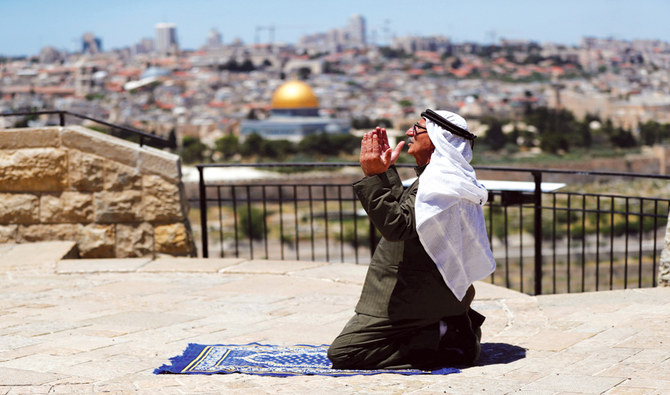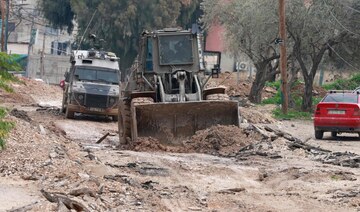AMMAN: Arabs were the first inhabitants of Jerusalem and have lived there for at least 5,000 years, according to a white paper published by an Amman-based think tank.
“They founded and built it in the first place — and have been there ever since,” the paper says.
Using unpublished documents, the paper, from the Royal Aal Al-Bayt Institute for Islamic Thought, seeks to correct the misperception “that Arabs are newcomers to Jerusalem.”
The institute, an Islamic non-governmental entity, is headed by Prince Ghazi bin Muhammad, personal envoy and special adviser to King Abdullah II of Jordan, since 2000.
Among the many references the document uses to make its point is the Amarna Correspondence, a series of diplomatic letters between Canaanite city-state kings and their Egyptian overlords during the 14th century B.C., which mention Jerusalem. The paper presents pictures of the cuneiform tablets uncovered in Egypt in the late 19th century to validate its argument.
Along with archaeological discoveries, the Biblical record is also used as a source to establish original Arab presence in Jerusalem. The Bible, the paper says, shows that “the Arabs, Hamites, Canaanites, and Jebusites were the original inhabitants of the land of Palestine, including the area of Jerusalem.” Canaanites and Jebusites were there long before the Jews, even before Judaism was revealed.
The 108-page document quotes passages from the Old Testament to establish that “Jerusalem was always an Arab city” and notes that, “the Palestinian Arabs of today are largely the direct descendants of the indigenous Canaanite Arabs who were there over 5,000 years ago. Modern-day Arab Muslim and Christian Palestinian families (such as the “Kanaan” tribe, direct descendants of the Canaanites) are the oldest inhabitants of the land.”
The paper mentions Salah Eddine Ayyoubi — the Muslim historical figure who fought the Crusaders and reclaimed Jerusalem in the 12th century, allowing the Christians to remain and inviting Jews expelled from Jerusalem by the Crusaders to resettle in the city — to validate its point.
According to Prof. Sari Nusseibeh, former president of Al-Quds University in Jerusalem, the white paper is a “well-referenced and clearly argued document.”
Nusseibeh’s family has been, since the seventh century, entrusted with the keys to the historic Church of the Holy Sepulcher (situated in the Christian quarter of the Old City of Jerusalem). The paper, he says, “debunks the Israeli and extremist Jewish narrative in more than one way, replacing it with a clear historic overview of continued Arab presence in the city and benevolent Islamic rule.”
On the Hashemite custodianship of Jerusalem’s holy sites, which is a pivotal theme of the white paper, Nusseibeh, one of the leaders of the first Palestinian intifada, says the document “recognizes the Palestinian role in the Hashemite custodianship, thereby emphasizing the special political relationship between the Palestinian people and the Hashemite Kingdom. In more than one way, it shows that a Hashemite custodianship of the holy sites, especially in the context of peace, promises a more secure place for all three religions than does the present policy of the Israelization of Jerusalem.”
HIGHLIGHTS
• Using unpublished documents, the paper, from the Royal Aal Al-Bayt Institute for Islamic Thought, seeks to correct the misperception that Arabs are newcomers to Jerusalem.
• Along with archaeological discoveries, the Biblical record is also used as a source to establish original Arab presence in Jerusalem.
The white paper also reiterates that “whenever Muslims controlled Jerusalem (in 638, 1187 and 1948), they did not expel Christians and Jews.”
Rather, it says, they guaranteed their rights and religious rights and even welcomed Jews into the city. This, it points out, is in contrast to the Christian expulsion of Jews in 630 and their slaughter of Jews and Muslims (and even Orthodox Christians) in 1099, and unlike “the Jewish slaughter of Jerusalem’s original inhabitants in 1,000 B.C.; the Sasanian-Jewish expulsion of Christians in 614, and even the expulsion of Palestinians in 1948.”
In other words, contrary to the misperception that Islam has no moral right to Jerusalem, Islam has historically been more peaceful and tolerant of other religions than either Judaism or Christianity, it notes.
Vera Baboun, a member of the Palestinian National Council and former mayor of Bethlehem, said that the Jerusalem white paper articulates the “diverse historical realities away from the exclusive narrative that Israel is adopting to deny the cultural, human, historical and religious rights of the Arab Palestinians whether we’re Christians or Muslims.”
It “puts the readers face to face with their own misconceptions and lack of knowledge, thus debunking the exclusive Israeli political or Biblical narrative which is used to negate the right and the existence of the Palestinian rights in Jerusalem or the Palestinian land at large,” she said.
The paper notes that Islam has been dominant in Jerusalem for 1,210 out of the last 1,388 years. “This is more than the period of Jewish domination over the last 3,020 years (953 years) or Christian domination over the last 2,000 years (417 years).”
To counter the prevailing notion that Jerusalem finds no mention in the Holy Qur’an, the paper states that for over 1,300 years, it was customary for Muslim pilgrims to visit Jerusalem after they had completed the Hajj to Makkah and Madinah.
The Al-Aqsa Mosque/Al-Haram Al-Sharif in Jerusalem is one of Islam’s three holy sites. According to the classical commentaries on the Qur’an, “the city,” “the land,” “the Holy Land,” “the Mount,” “the Temple” and “the Olive” all refer to Jerusalem or places in Jerusalem.

























